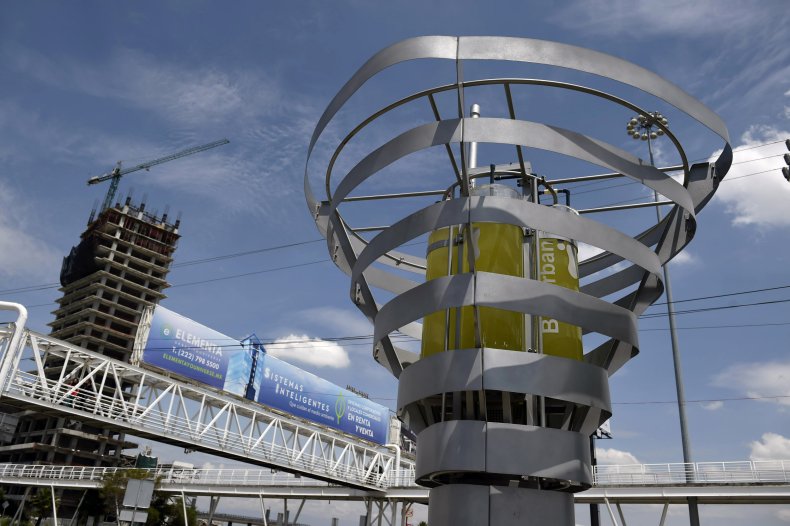The G7's 'Carbon Austerity' Will Fail. We Need a Positive Green Future | Opinion
The G7 nations declared recently that they will reach net zero emissions by 2050.
I don't believe they will, as long as climate goals are about restrictions, not opportunities. We should be investing in green startups as enthusiastically as we move away from fossil fuels. Currently non-G7 countries in the Middle East, Southeast Asia and Latin America are leading the way toward a positive green future, while industrialized nations see the climate as a reason for taxes, bans, or both.
The public does not want "carbon austerity" or "climate totalitarianism," but they can get excited about growth, diversification and new horizons.
Climate policy cannot just be about bans and restrictions—the pandemic has already exhausted much public tolerance for those. The transition to net zero, combined with the advent of the fourth industrial revolution (4IR), presents humanity with an opportunity to build a cleaner, greener and better global economy. The G7 member states, and others, must remember that the new green economy will not just be good for the environment, it must be good for humanity too.
The global, digitally-enabled fourth industrial revolution is already the fastest period of innovation in human history. The rapid developments of artificial intelligence, robotics, the internet of things, nanotechnology and biotechnology are already disrupting markets, creating jobs and lifting millions of people out of poverty.
The previous industrial revolutions, fueled by coal and gas, stimulated economic growth at the expense of the planet. The fourth industrial revolution could create new markets and economies while also enabling us to fight against planetary heating.
One such way is the enabling of smart cities. As it stands, according to a report published by NASA's Earth Observatory, "the 100 highest-emitting urban areas accounted for 18 percent of the global carbon footprint." A smart city is a city where technology is infused with every aspect of a city's operations, from waste removal to public transport and power supply. Through all of the 4IR's buzzwords, Big Data, the internet of things and artificial intelligence, a government would be able to monitor just about everything in order to make our cities greener, less noisy, less crowded and more enjoyable to live in. Electric-powered public transport, combined with smart data collection systems, will help our cities become more carbon-friendly, and fundamentally better places to live.

This will improve economies and quality of life. And it will also protect the environment. This isn't science fiction; non-G7 countries are already embracing this positive, aspirational green future. Saudi Arabia's plans for "the Line" have promised to "reimagine and revitalize the future of urban living." The city will be based on 100 percent renewable energy, including solar, wind and hydrogen based power generation, ensuring clean and pollution-free urban environments.
Or take, for example, the Mexican city of Puebla. A startup installed robotic trees that suck up as much air pollution as 368 real trees by using microalgae. While these suck up carbon dioxide from the atmosphere, they also suck up other micro-contaminants which can cause disease to city inhabitants. And similarly in Brazil, São Paulo authorities are using a combination of mobile data networks, machine networks and Big Data to monitor and predict pollution levels up to 48 hours in advance.
The fourth industrial revolution will not only help to prevent the causes of climate change, but mitigate its effects too. Big Data collection and analysis methods can be used to detect floods in natural disaster prone countries like Bangladesh. Similarly, location detection technology is so advanced in mobile phone and IoT devices that responders can determine the exact location of a caller; some estimates predict that some 10,000 people could be saved every year in the U.S. alone if emergency services adopted such precise location technologies.
The transition to a green economy, facilitated by the 4IR, will make our planet greener and our lives better at the same time. And while jobs will be lost as we pivot away from hydrocarbon fossil fuels and toward automation, many more will be created in the process. Just as 18th century Luddites destroyed the looms that they perceived threatened their livelihoods, many factory workers and fossil fuel workers may perceive the green new economy in the same way.
Yet every industrial revolution, from the steam revolution of 1698, to the coal revolution of the 18th century, ultimately created more jobs and allowed more people to enter the middle class. This industrial revolution will do the same, without damaging the environment.
The narrative of cutting back, scarcity and moral shaming needs to be counterbalanced with a positive vision of a green future, and G7 nations need to present this vision to their electorate. It is only through growing our economies within the confines of our planetary boundaries can we become a healthier, more sustainable and happier global society.
Joshua Jahani is a lecturer at Cornell University and New York University, and managing director at the investment bank Jahani & Associates
The views expressed in this article are the writer's own.


